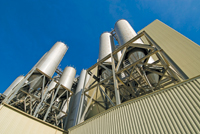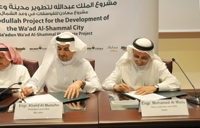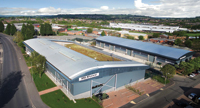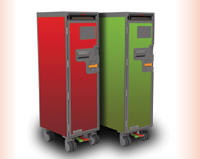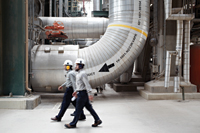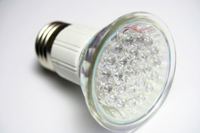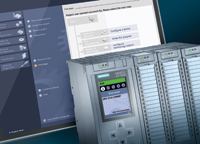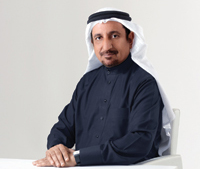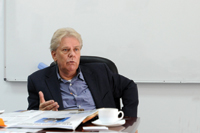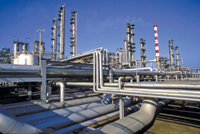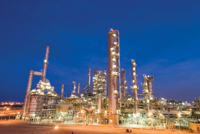
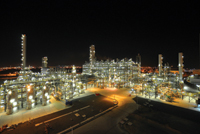 Linde ... well positioned in the world market
Linde ... well positioned in the world market
LINDE’S Engineering Division, one of the leading technology engineering, procurement and construction (EPC) companies across the globe, expects to generate the same level of revenue in its plant construction business in the current financial year as it did in 2012. It also hopes to achieve an operating margin of at least 10 per cent, this year, a top official of the company says.
“The business for 2013 has been robust and generally in line with last year. Competition from Far East EPC companies has eroded margins but as Linde Engineering is unique with its technology EPC strategy, we hope to have an equally successful year in 2013 as compared 2012,” says Ebubekir Koyuncu, managing director of Linde Engineering Middle East, in an exclusive interview with OGN.
Globally, the Linde Group turnover was €15.280 billion ($20.37 billion) with profit before tax of €1.687 in 2012. In the first six months of 2013, the revenue was €8.207. In the Engineering Division, the dynamic trend in orders which characterised the first quarter of 2013 continued in the second quarter. In the period from April to June 2013, Linde was also awarded a number of major projects in Russia and Asia.
“For Linde Engineering, a relatively stable market environment is expected in the international large-scale plant construction business. The current high order backlog creates a good basis for a solid business performance in the Engineering Division over the next two years,” Koyuncu adds.
In the long-term, Koyuncu says Linde is well-positioned in the international market for olefin plants, natural gas plants, air separation plants and hydrogen and synthesis gas plants, and will derive lasting benefit, in particular, from investment in two structural growth areas: energy and the environment.
FOCUS ON GCC Market
For Linde, the Gulf Cooperation Council (GCC) market is strategically important and will remain in high focus in the upcoming years. “The GCC region is strategically important to Linde Engineering and Linde is participating in bidding processes for projects which either fall directly in its technology portfolio, such as cracker projects in Qatar and/or technology driven EPC projects in the downstream petrochemicals sector,” says Koyuncu.
Linde Engineering is present in the Middle East since 1980 and has its regional headquarters in Abu Dhabi and other offices in Al Khobar, Riyadh and Jubail in Saudi Arabia.
 |
Linde … eyeing upcoming cracker projects |
Linde’s Engineering Division, which takes pride in being one of the leading technology EPC companies across the globe, has successfully completed a number of projects in the Middle East. Some of these include: The third ethylene cracker for Borouge in the UAE which is currently under commissioning. In 2013, Linde Engineering in consortium with Samsung Engineering successfully completed the acrylic acid plant for Tasnee and an amine recovery and C10 purification facility at the linear alpha olefin (LAO) plant for Saudi Basic Industries Corporation (Sabic) in Saudi Arabia.
Some of its on-going projects include the HyCo plus ammonia plant at Sadara; a revamp on ethylene glycol plant for Sabic (Sharq) and recently it has been awarded the largest CO2 purification and liquefaction plant worldwide by Sabic.
These projects are all generally being executed on a lump sum turnkey (LSTK) basis which is generally now the contracting model of most of the major operators in the region.
Out of all the on-going projects, the Sadara Petrochemical Complex is of special significance to Linde. In this project, Linde Gas will supply on an ‘over the fence’ basis hydrogen, carbon monoxide and ammonia to the approx $20 billion investment by Saudi Aramco and Dow Chemical in the petrochemical complex. The BOO (build, own and operate) model adopted by Sadara for this project is gaining acceptance in the region. The ‘on schedule’ project execution is essential for timely availability of the gases to operate the petrochemical complex and Linde has used a proactive innovative approach to make this project a success.
“Each project has its unique set of challenges but generally in Saudi Arabia we are faced with delays in obtaining ‘block visa’ and occasional difficulties in custom clearance of consignments. Sub-contracting resources scarcity has been seen especially in the Saudi Arabian market,” remarks Koyuncu.
Air separation plants are also core Linde technology and Linde Engineering generally participates in these projects. In addition to EPC, Linde has a wide and diverse portfolio of products such as fired heaters, cold boxes, specialised heat exchangers, incinerators, which are supplied on an EP basis directly to operators and or other EPC companies in the region.
OIL and GAS PROSPECTS
According to Koyuncu, the upsurge resulting from the ‘shale-gas’ boom in the US is unlikely undermine the GCC market as major investments are seen in the region in the next two years and beyond.
“While it may appear that the upsurge resulting from the ‘shale-gas’ boom in the US would undermine the GCC market but major investments are seen in the region in the next two years and Linde Engineering will strive to get its due share in these projects,” says Koyuncu.
“New crackers will be built in the entire GCC and with new crackers development of downstream industries will remain robust. Efforts to go toward ‘value added’ petrochemicals has started to emerge and will further strengthen in the next few years. All said, the region’s importance in the oil and gas sector will remain predominant and a strong global influence,” he adds.
The Linde Group, with its headquarters in Munich, Germany, has presence in more than 100 countries worldwide.
With more than 62,000 employees globally and around 200 in the region, the Linde organisation works on the philosophy of ‘empowering people’. “In the region we have a talented pool of multi-nationality highly skilled and motivated individuals.
Also, within the region we encourage maximum use of local resources,” Koyuncu adds.




































































